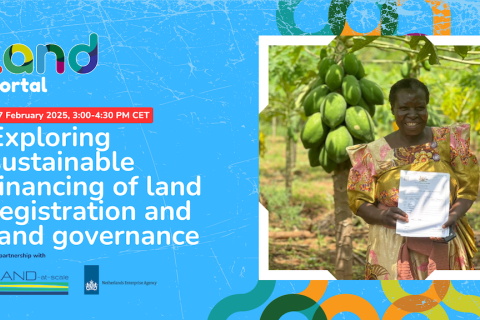Photo credit: LAND-at-scale
On February 27, 2025, the Land Portal Foundation hosted an insightful webinar on Exploring Sustainable Financing of Land Registration and Land Governance. As financial sustainability remains a major challenge for land administration systems worldwide, experts from Burundi, Uganda, Somalia, and international institutions shared their experiences and strategies to transition from donor-dependent models to self-sustaining financing mechanisms.
The session, moderated by Richard Baldwin, a land administration specialist and Land Portal Board member, opened with an acknowledgment of the pressing need to establish resilient, locally owned, and equitable land administration systems.
Gemma Betsema, Senior Programme Advisor at LAND-at-scale, emphasized the importance of integrating financial sustainability from the outset of projects. “Scaling land governance is not just about increasing the number of registered parcels but about improving systems and procedures so they become self-sustaining and future-proof,” she noted.
Perspectives from the Field: Successes and Challenges
Burundi: A Business-Model Approach to Decentralized Land Services
Rémy Ndayiragije, governance expert at VNG International, presented the business plan model being implemented in Burundi. The initiative has enabled local authorities to generate nearly half a million USD annually from land services, covering around 50% of a municipality’s annual budget.
“The key to sustainability,” Rémy explained, “is aligning land registration fees with local cost-of-living standards while ensuring equitable access for vulnerable groups such as women and the Batwa community.” He further stressed that systematic land registration helps ensure that richer individuals subsidize the registration costs for lower-income citizens, promoting inclusivity.
Uganda: Transitioning from Donor Dependence to Self-Financing
Sarah Akileng, Technical Advisor at GIZ Uganda, shared insights from the Responsible Land Policy Project (RELAPU), which has facilitated customary land registration using a self-financing model.
“We started transitioning in 2022 by requiring communities to contribute a minimal fee for land registration,” she said. “Community demand has been overwhelming, and local leaders have been instrumental in setting affordable fees.”
She outlined several key strategies that contributed to this transition:
- Utilization of existing government structures rather than external contractors
- Community-led awareness campaigns to highlight the benefits of land registration
- Inclusion of land registration services in district annual budgets to ensure continuity
Fees remain affordable, with costs averaging €10-€12 per registration, making it accessible to even the most marginalized communities.
Somalia: Harnessing Land Value Capture for Financial Sustainability
Abdihakim Abdullahi Omar, Senior Advisor to the Vice President’s Office in Puntland, Somalia, presented an alternative approach: land value capture (LVC) as a tool for financing urban land governance.
“In Bosaso, we have a thriving informal land market dominated by brokers and traders. We are now working on regulating and integrating these actors into formal revenue systems,” he explained.
One key initiative has been securing 435 plots with title deeds for internally displaced persons (IDPs), enhancing land tenure security while generating municipal revenues. The introduction of a progressive taxation system is another crucial step, ensuring higher-value properties contribute more while keeping taxes affordable for low-income residents.
Global Insights: Designing Financially Viable Land Administration Systems
Christelle van den Berg, Regional Manager at Kadaster International, provided a comparative perspective, drawing from experiences across Africa and beyond. She emphasized three critical success factors for financial sustainability:
- Political commitment: Land governance must be high on the national agenda.
- Institutional collaboration: Agreements between national and local authorities are essential.
- A well-defined business model: Revenues must cover operational costs while ensuring affordability.
She also highlighted the role of international partnerships, such as the World Bank and the EU, in funding initial land registration efforts. However, she warned, “Investments should only be made if there is a clear strategy for long-term cost recovery and self-sufficiency.”
The Role of Open and Transparent Land Data
The panelists unanimously agreed that open and transparent land information systems are key to both financial sustainability and public trust. Remy Ndayiragije argued that a National Land Information System accessible to all stakeholders can drive revenue generation while reducing opportunities for corruption. Sarah Akileng reinforced this point, adding that increased transparency improves accountability and trust in land governance systems.
Key Takeaways and Next Steps
The webinar underscored that sustainable financing models for land governance require a multi-faceted approach, including:
- Innovative financing mechanisms such as LVC, self-financing, and progressive taxation.
- Strong legal and institutional frameworks to support decentralized land administration.
- Incentives for community participation to ensure affordability and equity.
- Strategic donor support that emphasizes long-term sustainability rather than short-term project funding.
As global donor-driven funding for land governance projects declines, countries must explore alternative, locally driven financing strategies. The examples from Burundi, Uganda, and Somalia highlight that while the paths may differ, a common commitment to financial independence, inclusivity, and transparency is essential to achieving sustainable land governance.


